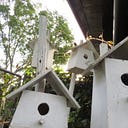Getting the most out of self-help books
How to effectively choose and apply their ideas
Self-help books are great, but have developed a stigma, a well-deserved one.
This blog post outlines the problem with self-help books, and presents some strategies that can help you avoid this, and get the most out of your valuable time.
The problems
Self-help books are only valuable insofar they change your actions. Unfortunately, many people read them, get a warm fuzzy feeling inside, and leave it at that. There needs to be a concrete plan of action, a set of steps to take.
Many self-help books are crap. Any person with moderate success in anything can write one to make a quick buck. They are not based on empirical evidence, and there is no gaurantee that the ideas will work.
Lastly, even books with good ideas are often not worth reading in full. Self-help books are mostly composed of a maximum of three chapters worth of good ideas, with the rest being ‘fluff’, anecdotal evidende that sells the idea.
The solutions
Not reading self-help books at all is not the solution here. Improving yourself is important, so I will provide some ways you can do so effectively, and cut down on the bad side of self-help.
A plan of action
While reading a self-help book I jot down notes, not extensive, but for figuring out how I can apply the book. I am forming a plan of action as I read, a set of actionable steps I can take.
These steps must then be anchored in habit[L1] . Figure out something small you can do every day, and get it done.
For example, my final notes on Deep Work consisted mainly of a recurring task on my to do list: make a schedule. Under this task I listed some of the scheduling techniques mentioned in the book. That was it.
What I also find useful is writing down a set of questions for myself. In Deep Work I wrote down and thought about whether I really needed Twitter, or if it was just interrupting my meaningful work (yes it was). Collecting such cues for reflection and periodically reviewing them is quite helpful.
Reading different books differently
If you consume a lot of self-help books, then it is definitely worth acquainting yourself with some speed-reading techniques. The often shallow content lends itself to this.
Additionally, you can skip or skim over most of the anecdotes, they’re not really useful.
Choosing better books
Another way you can ensure you get more value out of your reading is choosing better books. The thing is, if you consume a prodigious amount of self-help books, you’re going to end up reading a prodigious amount of garbage.
My advice is to spend your time elsewhere, and when you come across a book that seems absolutely worth reading, go for it.
A grain of salt
Since many self-help books rely on anecdotal evidence, it naturally follows that their lessons will only apply to a few people. Read skeptically, try out some of the techniques, but don’t feel you need to force yourself to apply everything.
Self-help books are great, if you deal with them correctly. Create a plan of action, skim over parts, read less, and take what you read with a grain of salt and you should be on your way to more effectively applying the lessons you learn and improving yourself.
